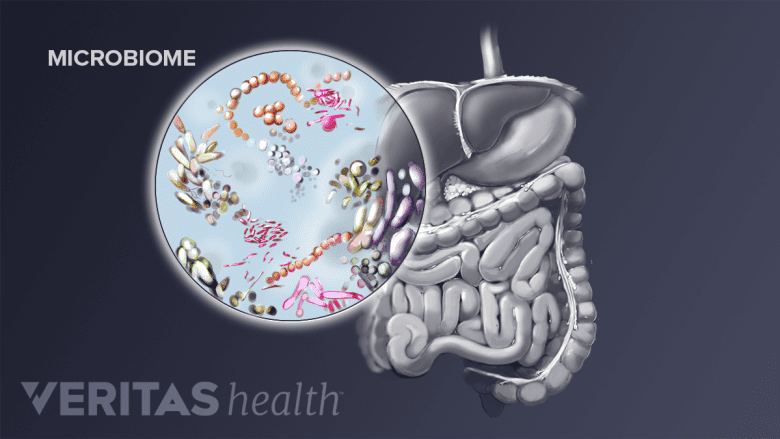When doctors talk about treating arthritis, they often recommend medications, physical therapy, exercise, and losing weight, but they rarely recommend eliminating or adding specific foods to a diet. However, research suggests diet can impact the inflammation that causes arthritis pain, including pain from rheumatoid arthritis, psoriatic arthritis, ankylosing spondylitis, and other diseases.1Round JL, Mazmanian SK. The gut microbiota shapes intestinal immune responses during health and disease. Nat Rev Immunol. 2009;9(5):313-23.
This article discusses how diet influences arthritis pain and specific steps people can take to reduce pain through diet.
In This Article:
- Improving the Gut Microbiome and Arthritis Symptoms with Diet
- The Science Behind Leaky Gut, the Gut Microbiome, and Arthritis
- Foods for a Healthier Gut and Less Arthritis Pain
Connecting Diet to Arthritis Pain

Maintaining a healthy gut microbiome may help to reduce symptoms of inflammatory arthritis.
Three key points help explain how diet and arthritis pain are related:
- Diet influences the gut microbiome. The gut microbiome refers to the trillions of bacteria and other microbiota that naturally live along the digestive tract. A gut microbiome’s diversity and balance of species are influenced by diet.
- The gut microbiome affects overall health. An imbalance in the gut microbiome is associated with chronic inflammatory disease, such as arthritis as well as other conditions, such as ulcerative colitis.
- The best way to maintain a healthy gut microbiome is to maintain a healthy diet. A dietary change can cause a temporary shift in the gut microbiome relatively quickly, but establishing a permanent shift is difficult and uncertain. People who want to reduce arthritis symptoms are advised to make a long-term commitment to eating a healthy diet that emphasizes plant-based whole foods.
See Connections Between the Gut Microbiome and Arthritis
Experts are still learning about if and how permanent shifts can be made in the gut microbiome. At least one microbiologist suggests that some permanent change is possible after 9 to 15 months of dietary adherence.2Gilbert, J and Knight, R. Dirt Is Good: The Advantage of Germs for Your Child's Developing Immune System. New York: St. Martin's Press. 2017;105. Others believe that changes in the gut microbiome last only as long as the diet does.
See Reduce the Risk of Arthritis by Improving the Microbiome
Arthritis Involves Inflammation
Almost all types of arthritis involve inflammation. There are dozens of types of inflammatory arthritis, including but not limited to rheumatoid arthritis, psoriatic arthritis, ankylosing spondylitis, gout, and pseudogout. Even osteoarthritis—which, unlike most other types of arthritis, is not an autoimmune disease—can involve inflammation.
Food sensitivities are not always easy to recognize
People with arthritis may have food sensitivities of which they are not aware. In these cases, foods can trigger a series of biochemical reactions in the body that lead to inflammation and joint pain.
See How Gluten Can Cause Joint Pain
These food sensitivities can occur without producing gastrointestinal symptoms. It is possible to have food-triggered arthritis but not have notable stomach pains, bloating, or diarrhea.
How is this possible? Learn more about the science behind leaky gut, the gut microbiome, and arthritis on the next page.

